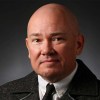How you knew him depended, at least in part, on when you knew him.
To most longtime friends, he was simply German — pronounced GEHR-mun. No first name necessary. Friends can’t explain it; that’s just how it was.
Under the right circumstances during his days at the Las Vegas Sun, he was “The Germundo.” And, honestly, not nearly enough is made of this.
More recent members of his circle knew him by the traditional “Jeff.”
No generation of friends nor acquaintances, though, knew Jeff German the way he’s often been portrayed in the weeks since his murder: as the unapproachable, hard-nosed investigative journalist who only cared about his next story.
But they can understand the misperception.
“Jeff could come off as gruff or grouchy — especially to people outside his profession,” public relations executive George McCabe says. “I don’t think that bothered him much. And I loved that about Jeff.”
One of his closest friends, McCabe was a summer intern at the Sun in the mid-1980s when he first met German. He only recently started calling him Jeff.
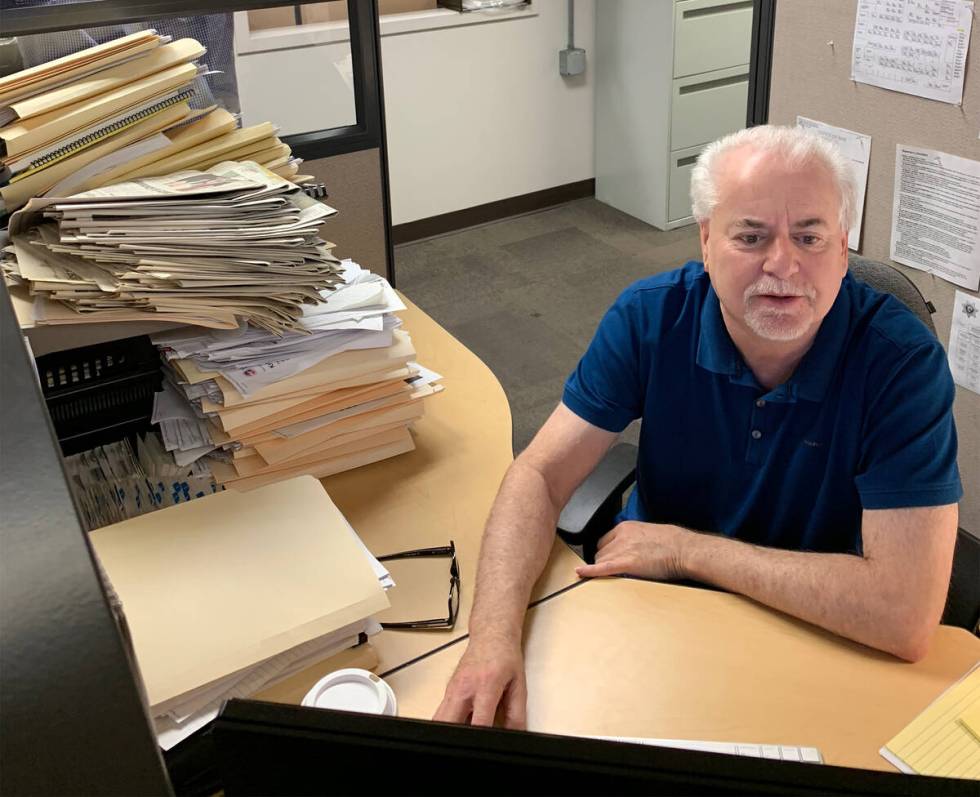
Surrounded by friends
“Jeff just had a great laugh.”
Larry Henry, the former political editor at the Sun, breaks through German’s hard exterior like that cartoon owl going at a Tootsie Pop.
“A bunch of us would be in the kitchen playing poker or something,” Henry says. “Jeff would be in another room. You’d hear that laughter just jump out from another room. It just warmed your heart, because he was such a good human being.”
Before the pandemic, German was rarely not in the company of friends. Lunches. Dinners. Even breakfasts. He could’ve gotten by without owning a single pot or pan.
During German’s early years at the Sun, where he worked from 1978-2009, each week counted down to shooting pool on Friday afternoons at the PT’s Pub on Rainbow and Alta. “Let’s go, PT’s” became such a common saying, he inscribed those words years later in Henry’s copy of German’s book, “Murder in Sin City: The Death of a Las Vegas Casino Boss.”
German went where the action was, dating back to when Las Vegas was small enough for the city’s movers and shakers to gather at a TGI Friday’s on East Flamingo.
“You couldn’t get in the place,” former Review-Journal entertainment writer Mike Weatherford recalls. “It was six deep around the bar. … It was the legal community; Ed Bernstein with his ponytail. ‘Politicos’ as German liked to call them.”
That laughter, though, could cut through it all.
It was front and center when Henry awoke Sept. 4 to text messages about German’s death.
“The first thing that came to my mind was that belly laugh,” Henry says. “I just thought, ‘Man, that thing’s now been silenced.’ ”
‘This is what I do’
German loved jazz and the blues, took pride in his home and its landscaping and could surprise people who’d known him for decades with a previously hidden interest, such as his knowledge of plants.
“He was an elite reporter, but he never acted that way.”
He was the friend who remembered everyone’s birthdays.
When it came time to goof on each other, and that time came often, German could give as good as he got — but he didn’t mind playing the straight man.
Back in the day, the rivalry between the two newspapers was intense. There were Sun bars, and there were RJ bars. While German had friends at both papers, he loved a scoop too much to talk shop when the opposition was around. That’s why, once he came to the Review-Journal in 2010 after being laid off at the Sun, former competitors were surprised by how approachable he was.
“He was an elite reporter, but he never acted that way,” says Steve Sebelius, the Review-Journal’s politics and government editor who started working with German at the Sun in 1993. “He was always collegial. He would always ask for help.”
Friends say German, who died at 69, never wanted to quit on a story. That tenacity extended to his career, as well.
“I don’t want to retire,” German once told fellow RJ investigative reporter Arthur Kane. “This is what I do. This is what I do.”
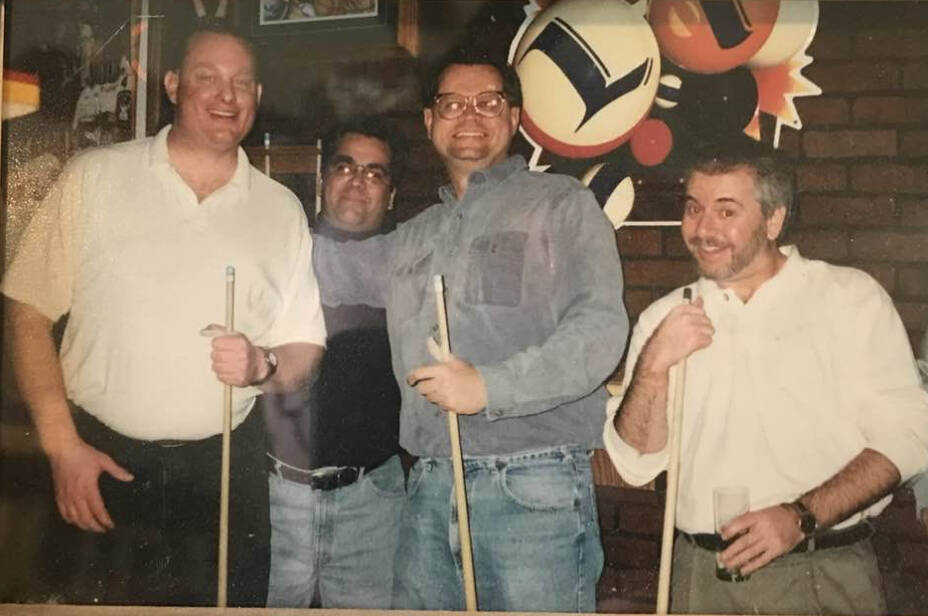
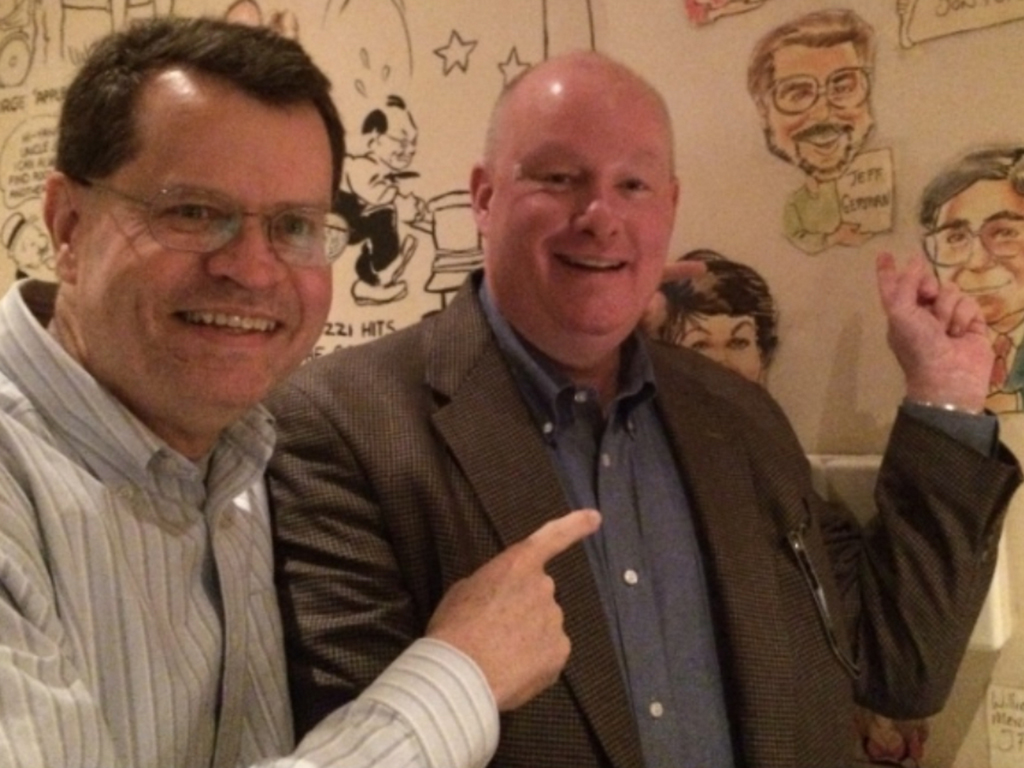 Jeff German's friends Larry Henry, left, and Steve Sebelius point to the caricature of German on the wall at The Palm restaurant in Caesars Palace. (from Larry Henry)
Jeff German's friends Larry Henry, left, and Steve Sebelius point to the caricature of German on the wall at The Palm restaurant in Caesars Palace. (from Larry Henry) 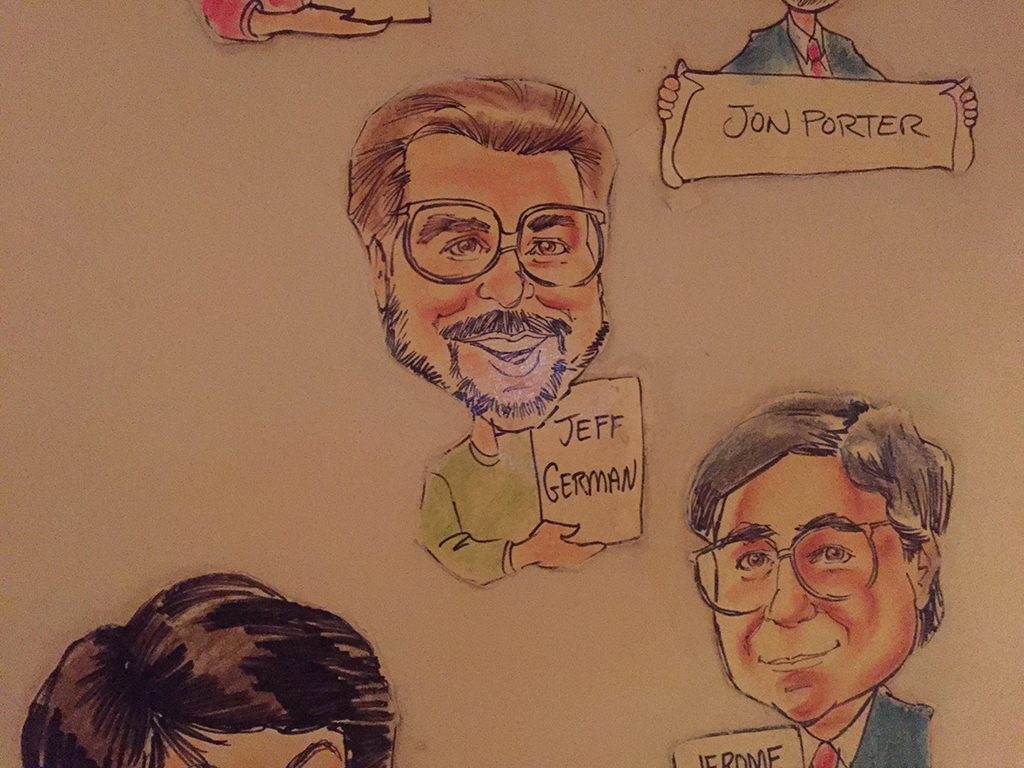 Jeff German's caricature graced the wall at The Palm restaurant in Caesars Palace until a 2016 renovation. (from Larry Henry)
Jeff German's caricature graced the wall at The Palm restaurant in Caesars Palace until a 2016 renovation. (from Larry Henry) Sacrificial lunches
You could almost set your watch by it.
Without fail, the landline would ring each workday between 11:40 and 11:45 a.m. as German checked in on his good friend Frank Fertado, the RJ’s features editor from 1982-2012. It was a daily dance to see whether German’s desire to be with friends could overcome whatever meal he’d have to endure at the coffee shop or diner Fertado had picked.
“See, Frank always went for the good deal,” says Art Nadler, German’s close friend who was part of those lunches’ rotating cast of characters, “and usually it was a cheap deal.”
Those lunches took place at such culinary hotspots as the coffee shops inside the California and in the basement of Binion’s, the Silver Nugget and the old Opera House in North Las Vegas, and freestanding joints like Lou’s Diner and the former Sunshine Cafe, both on Decatur.
Fertado, who died in 2014, was set in his ways. He had a $6 or $7 maximum depending on the era, and that money couldn’t be spent on fast food. Each location had to be sit-down, with full service. Fertado routinely would boast about what a good deal he got on his meal, then comically seethe when German inevitably ordered something pricey.
German never tired of the ritual.
Immortalized at The Palm
Left to his own devices, German would have dined in proximity to the city’s power brokers, places where cops or lawmakers would pull up a chair and join him.
He was always working or networking, even subconsciously. German would frequently take work-related phone calls during those meals with friends. “But in between,” Nadler recalls, “we’d spend time together.”
German would have preferred to have eaten at downtown’s Triple George Grill, Big Dog’s Brewing Company on Rancho for its ties to his native Wisconsin, or the comparative splendor of The Palm at Caesars Palace.
Sebelius and Henry were leaving a lunch years ago at the latter, studying some of the caricatures on the wall, when they recognized an old friend.
“We suddenly realized,” Sebelius recalls, “ ‘Oh my God, that’s German! And look at the glasses! And the beard!’ ”
The caricature, part of a tradition that began in the 1920s at the original New York location of The Palm, had been drawn directly on the wall so long ago, it sparked laughter and joyous memories of their friend’s dark, lush locks and his full dark beard as they posed for photos with it.
They weren’t laughing, Sebelius stresses, at the fact that German’s portrait was there. “That was, like, understood,” he says. “Of course, German’s going to be up on the wall at The Palm. Yeah, absolutely. He’s an institution in this town.”
Sadly, that wall and the caricatures on it were lost to history during a 2016 renovation.
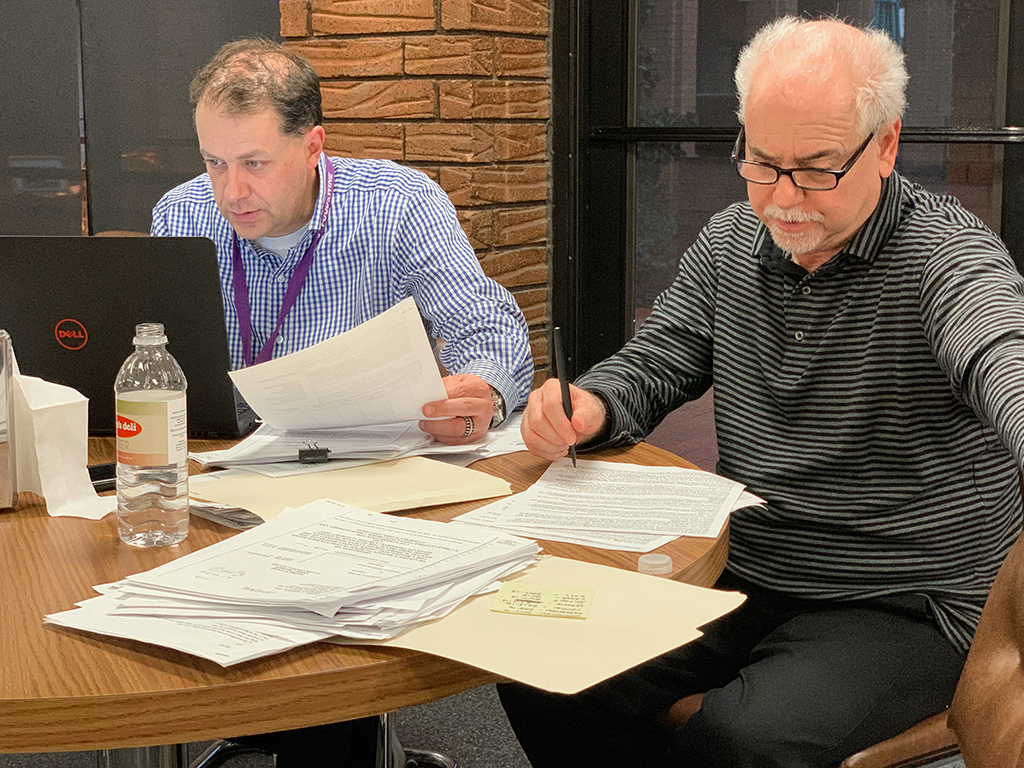 Investigative reporter Jeff German, right, works with his colleague Arthur Kane on Feb. 14, 2019, at the Review-Journal offices. (Harrison Keely/Special to the Las Vegas Review-Journal)
Investigative reporter Jeff German, right, works with his colleague Arthur Kane on Feb. 14, 2019, at the Review-Journal offices. (Harrison Keely/Special to the Las Vegas Review-Journal)  From left, Karisa King, Jeff German and Carri Geer Thevenot confer in the Review-Journal newsroom. (Harrison Keely/Special to the Las Vegas Review-Journal)
From left, Karisa King, Jeff German and Carri Geer Thevenot confer in the Review-Journal newsroom. (Harrison Keely/Special to the Las Vegas Review-Journal) A new challenge
German was an old-school journalist in every sense of the word.
Cultivating sources. Gaining their trust. Working them relentlessly.
“He began every call with a source with ‘What’s new?’ and ended each call with ‘What else?’ ” remembers Francis McCabe (no relation to George).
Yet he wasn’t afraid of learning a new medium. Apprehensive maybe, but not afraid.
“When we first started, I remember he was so nervous,” recalls Larry Mir, who oversaw studio and field production for the second season of “Mobbed Up: The Fight for Las Vegas.” The two worked together for the better part of a year on the eight-part true-crime podcast German wrote and hosted.
There’s such a difference between writing for the eyes, which German had mastered over a four-decade career, and writing for the ears as podcasting requires.
“I think he was really worried about writing the scripts and then how he was going to translate that to reading his own words out loud,” Mir says.
It took a couple of episodes, but German found his groove.
Saturday night, during the Nevada Press Foundation’s awards banquet at the Westgate, hours after German was inducted into the Nevada Newspaper Hall of Fame, Season Two of “Mobbed Up” was named the state’s Podcast of the Year.
The awards are supposed to be kept secret, but those results have a way of making it to winners ahead of time.
“He told me he was so jazzed to win the award,” recalls German’s editor, Rhonda Prast, who oversees the investigative team and worked with him on the editing and production of the series. “I was thrilled for him.”
One of their final conversations was about plans to sit together at that banquet.
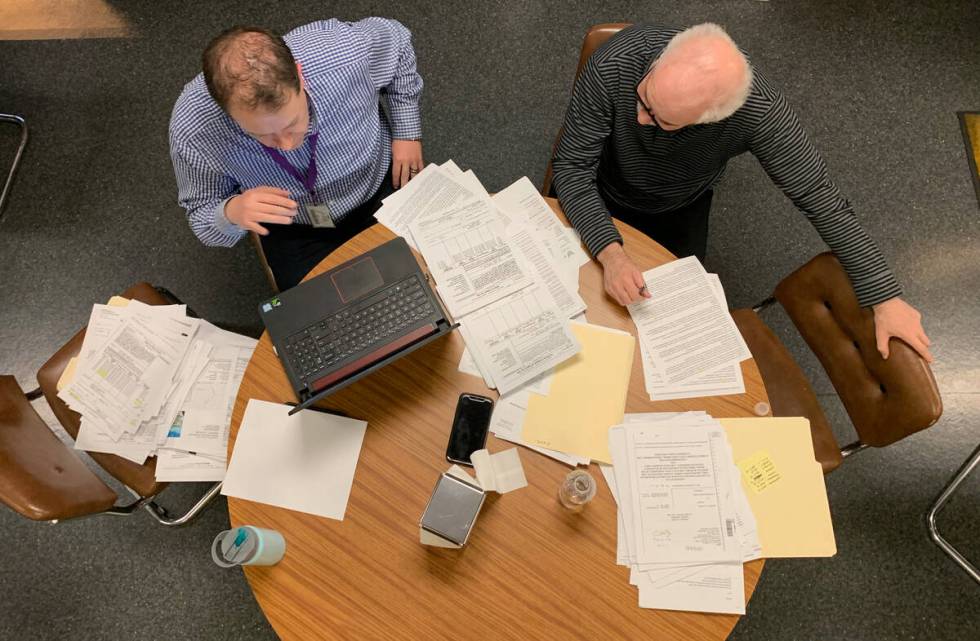
‘I thought you said this was hard’
A native of Milwaukee, German was loyal to the Bucks, Brewers and Green Bay Packers. As dedicated as he was in his reporting, good luck getting him to work on editing those stories while his teams were playing.
He had all the cable TV sports packages back before that was common, and friends would gather at his house for big games and boxing pay-per-views. He’d open up his home for Super Bowl parties, especially when the Packers were playing.
“He wanted to make sure he had all his friends in one place,” Weatherford says, “so he was the host.”
German spent most of his first four years at the Review-Journal shoehorned alongside colleague Francis McCabe in a tiny office at the Clark County Regional Justice Center.
McCabe, who’s now the director of public affairs for UNLV, soon recruited him to join the paper’s “highly competitive” fantasy football league, gushing about how hard it was to win.
German was gracious when he captured the title in his first year. He won it again the next year, something that had never been done.
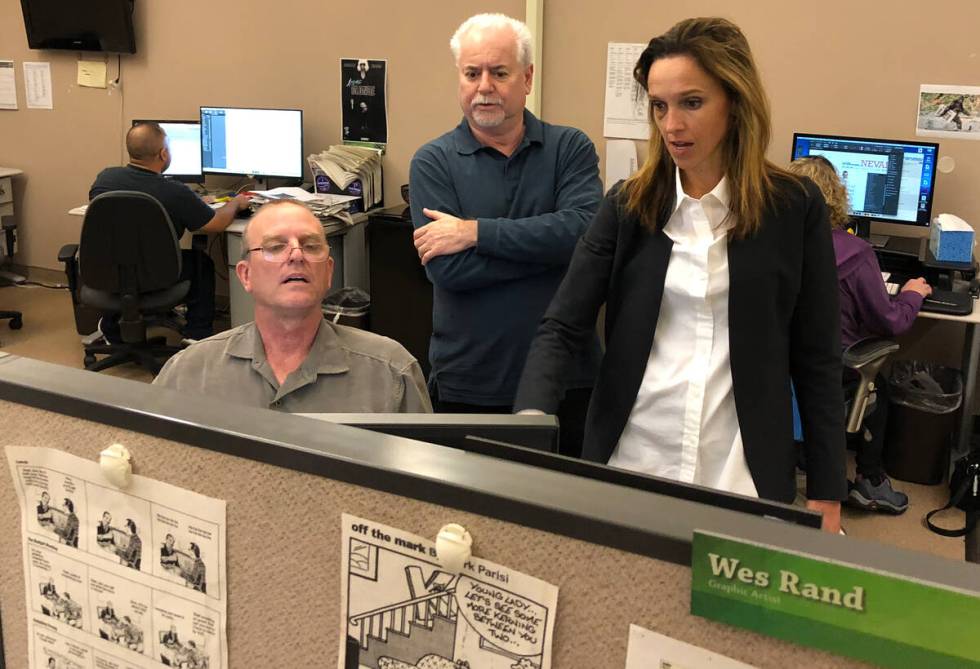
“I won’t forget, after he cemented his second championship in a row,” McCabe says, “he turned to me in our cramped quarters and said, ‘I thought you said this was hard.’ ”
In 2016, while preparing the announcement that German would become the first member of the Review-Journal’s investigative team, Karisa King, its then-leader, tried in vain to get him to talk about himself. German simply wasn’t interested in sharing his personal life outside his circle of friends.
“He has no notable hobbies,” King ended up writing alongside a partial list of his accomplishments, “but continues to revel in his victories as a two-time champion of the Review-Journal Fantasy Football League.”
That winter, he won his third title.
A small football now sits on German’s desk as part of a makeshift tribute. It bears the words “RJFL CHAMPION — 2011 2012 2016 — RIP JEFF.”
Losing a patriarch
The only thing German loved more than his friends and work was his family.
He wasn’t married and had no children, but German’s siblings and their kids meant everything. Those siblings remain devastated by his murder, but they issued a statement for this story:
“On behalf of the German family, we want to thank the community for its support, kind words and contributions in Jeff’s memory. We want to thank the LVMPD for its hard work, dedication and professionalism.
“Jeff’s life was taken prematurely by this violent, senseless act. Jeff was the patriarch of our family. He was loved and will be immensely missed by his siblings, his brothers-in-law, his nieces and nephew, and all his friends. We will be dedicated to preserving his memory in our personal daily lives and in the community.”
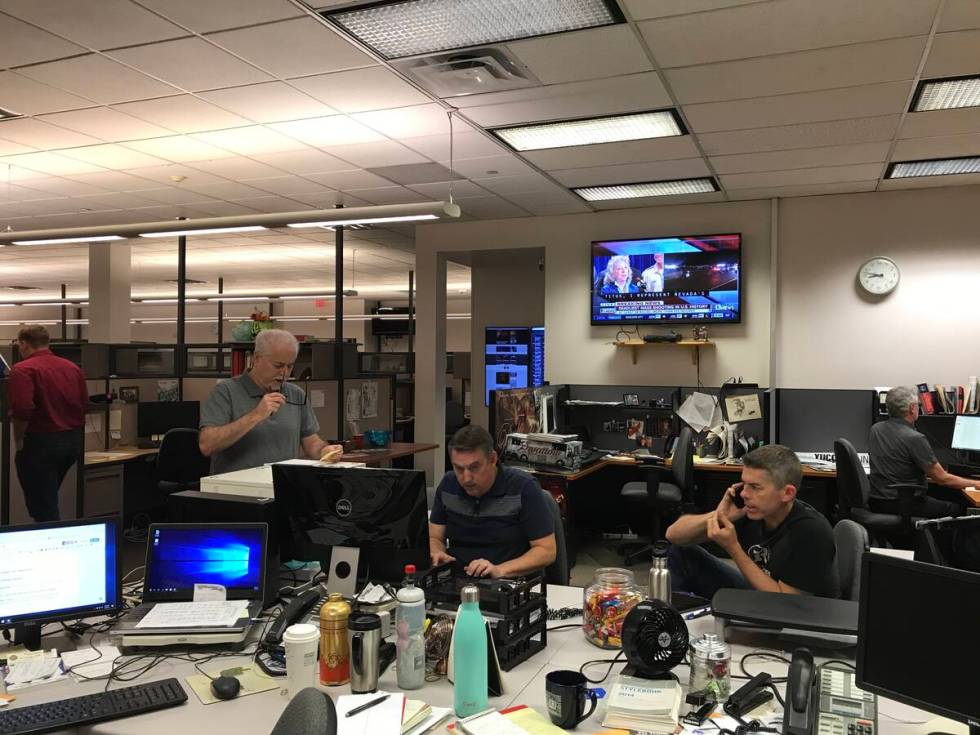
In his own words
German didn’t talk much about himself.
Jeff didn’t either, although there’s a good chance “The Germundo” did.
He opened up, though, in the acknowledgments section of “Murder in Sin City.”
The book, published in the summer of 2001, covered the downward spiral and death of casino heir Ted Binion and the subsequent murder trial that captivated the city. German had written more than 350 stories and columns on the subject, and the book became his calling card. Then it became the basis for the 2008 Lifetime movie “Sex and Lies in Sin City.”
Weatherford, who’d known German since shortly after arriving in Las Vegas near the end of 1987, remembers attending a book signing, then waiting while someone ahead of him monopolized German’s time. After finally interrupting the two, Weatherford realized the offending party was then-Gov. Kenny Guinn, a testament to German’s status.
But back to those acknowledgments.
German made sure to thank his “group of close friends — among them, Art Nadler, Frank Fertado, George McCabe, Rob Powers and Will Kemp — who put up with me for months while I was busy writing. Over drinks and coffee, they kept my spirits high and, once in a while, gave me good advice.”
“My family members were especially supportive and understanding. … I love you all,” he added.
“Finally,” German wrote, “I wish to thank my mother, June German, who like many Las Vegans was enthralled with this story. Mom never missed reading one of my articles. She was my inspiration, always believing, even when I had my doubts, that I was capable of writing this book. She passed away six weeks before I signed my book deal and never got to see the trial. You will always be in my heart, Mom. This is for you.”
Contact Christopher Lawrence at clawrence@reviewjournal.com or 702-380-4567. Follow @life_onthecouch on Twitter.




